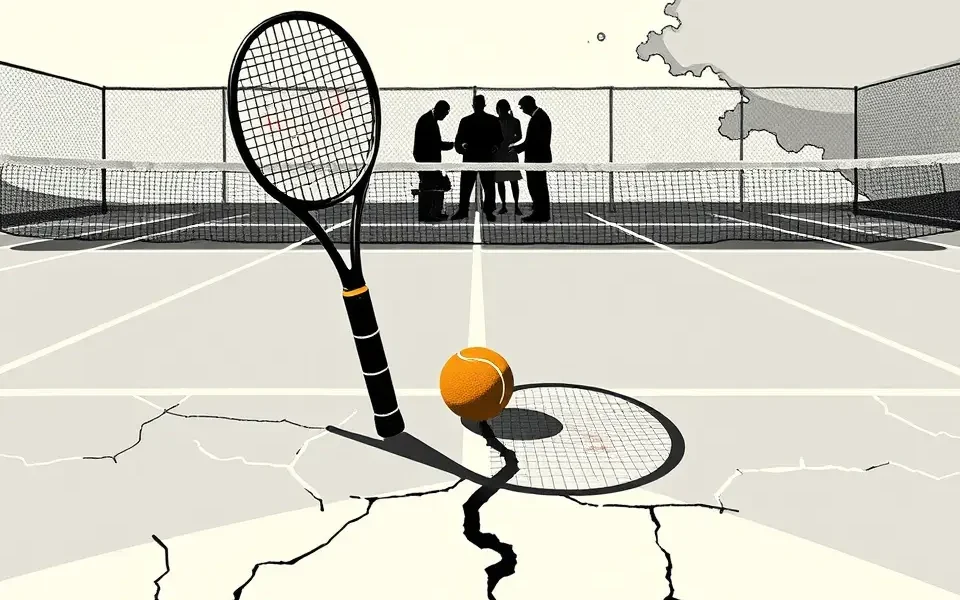The Professional Tennis Players Association (PTPA), co-founded by Novak Djokovic and Vasek Pospisil, is facing backlash for its perceived “brutal” stance towards Jannik Sinner, specifically regarding his alleged failure to publicly address issues concerning a purported “cartel” within the sport’s governing bodies. This criticism comes amid broader legal actions taken by the PTPA against the ATP, WTA, ITF, and ITIA, accusing them of anti-competitive practices and a disregard for player welfare. The PTPA’s singling out of Sinner, particularly in light of his recent doping suspension, has ignited debate and controversy within the tennis community.
PTPA’s “Cartel” Accusations and Legal Action
The PTPA has been vocal in its criticism of the established tennis organizations, alleging that they operate as a “cartel” that exploits players, suppresses earnings, and jeopardizes their health and safety. In March 2025, the PTPA, backed by over a dozen professional tennis players, initiated a series of legal actions in the U.S., UK, and EU against the ATP, WTA, ITF, and ITIA. These lawsuits expose systemic abuse, anti-competitive practices, and a blatant disregard for player welfare that have persisted for decades.
Key issues raised by the PTPA include:
- Suppression of competition between tournaments: This reduces prize money for players.
- Draconian ranking points system: This forces players to compete in certain tournaments.
- Unsustainable schedule: This leads to players competing in extreme heat and late at night.
- Financial exploitation of players.
- Invasive anti-doping practices.
The Sinner Controversy: Doping Ban and Alleged Preferential Treatment
Jannik Sinner, the world’s top-ranked player, recently served a three-month ban after testing positive for clostebol, an anabolic steroid, in 2024. While Sinner accepted the ban, the PTPA has questioned the handling of his case, suggesting that he received preferential treatment compared to other players.
Specifically, the PTPA has pointed to the ITIA’s swift acceptance of Sinner’s explanation that the positive test was due to accidental contamination from a physiotherapist’s treatment. The PTPA also highlighted the contrast between Sinner’s case and that of Marco Trungelliti, an Argentinian player who reported match-fixing and allegedly faced threats and a lack of support from tennis authorities.
“Brutal Stance” and Criticism of Sinner’s Silence
The PTPA’s criticism of Sinner extends to his perceived silence on the issues of corruption and unfair practices within the sport. Some interpret this silence as a tacit acceptance of the status quo, further fueling the PTPA’s discontent. This perceived lack of vocalization has led to accusations of the PTPA having a “brutal stance” on Sinner because he hasn’t voiced opinions on the alleged “cartel.”
Reactions and Fallout
The PTPA’s actions have drawn a mixed response from the tennis community:
- Sinner’s fans: Some fans have expressed outrage at the PTPA’s singling out of Sinner, viewing it as an unfair attack on a player who followed due process and accepted his ban. Some have even accused Novak Djokovic, a co-founder of the PTPA, of jealousy towards Sinner’s success.
- Tennis analysts and observers: Some observers have questioned the PTPA’s tactics, suggesting that targeting individual players undermines the organization’s broader goals of systemic reform.
- Other players: Some players, like Nick Kyrgios and Stanislas Wawrinka, have voiced their disappointment at Sinner’s seemingly lenient punishment, further fueling the controversy.
PTPA’s Broader Agenda and Goals
Founded in 2019 by Novak Djokovic and Vasek Pospisil, the PTPA aims to advocate for players’ rights and create a more transparent and fair system in professional tennis. The organization seeks greater equality in terms of opportunities and financial rewards for players, particularly those outside the top ranks. The PTPA’s recent legal actions and its criticism of Sinner are part of a broader effort to challenge the established power structures in tennis and bring about meaningful reform.
The Road Ahead
The controversy surrounding the PTPA’s stance on Jannik Sinner highlights the deep divisions and tensions within the world of professional tennis. As the PTPA pursues its legal challenges and continues to advocate for change, it remains to be seen whether its tactics will ultimately lead to a more equitable and transparent system for all players. The case also raises important questions about the responsibilities of top players to speak out against perceived injustices and the potential consequences of silence.








No Comment! Be the first one.